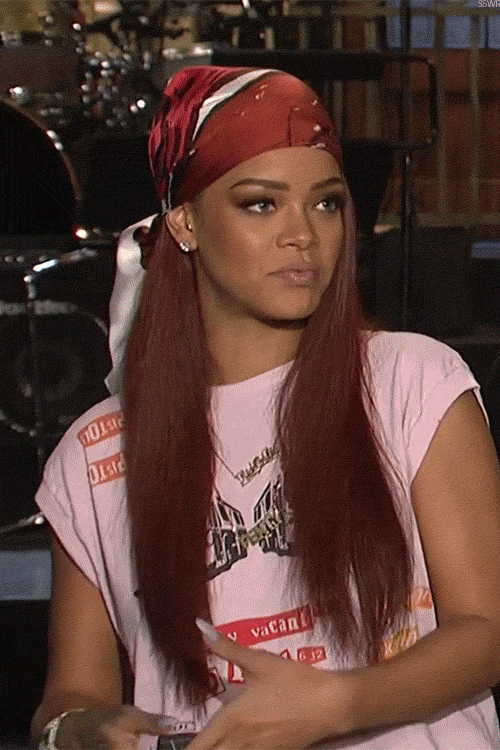Rihanna is using her new Fenty luxury clothing house to do way more than just sell us designer garments we can drool over. She's also making sure that all imagery associated with her brand represents the real people and bodies existing in the world.
Fenty fans fell out with joy when they realized she used an untouched photo of a model with facial scars in a Fenty earring ad. Now that she's opened her first New York pop-up shop, Rihanna is bringing even more realness to the people via the mannequins that display her fire new threads.
Rihanna's Fenty mannequins have REAL curves, people.
"Here for this mannequin having hip dips and a little pooch," a fan pointed out. "Putting regular body images back into our minds >>>>>>."
Seriously, what is this magic that Rihanna is working?! Oh yeah, it's simply called letting the depictions of bodies reflect what regular folks really look like as opposed to going with the default ultra-slim-model look.
So many people are really seeing their body type shown in the retail space for the first time in their lives.
"I was today years old when I seen my first mannequin with hip dips like me! Thank you, Fenty," a person wrote to the brand.
To clarify, representation (yup, there's that buzzword again!) truly does matter. It's not just a buzzword. It's a reality because imagery is powerful.
When you grow up never seeing your body type or skin color or hair texture shown in the media, it sends a subtle yet impactful message.
The message conveys that it's an undesirable look that is not worth showing. Hence, the obsession with thinness or whiteness or blondness — and oftentimes, all three. "!!!! I have hip dips and saw it as an imperfection and now a Fenty mannequin has them and they look bomb," a person wrote about a revelation inspired by the Fenty display. Her tweet alone shows how imagery can transform a mindset or at least encourage the first step in that transformation.
For a better understanding of how important equal representation is, consider that the average person sees THOUSANDS of ads each day, according to statistics.

Forbes specifically noted that the average person sees between 4,000 to 10,000 ads a day. Consider that the majority of those ads present thinness and perfection as the standard. Also, factor in the understanding that those ads do not include the actual television shows, films, music videos, and yes, MANNEQUINS, we regularly see that promote the same ideals. It's a tough world out there for people with regular bodies, as in most of us. Sure, self-motivation is a great thing, but we can't underestimate the power of visual rearing in society.
This is why people are completely freaking out over the Fenty mannequin having hip dips and a belly pouch.
Fans are literally thanking the brand for showcasing a real body type with its mannequins. We also should be comparing just how many people have hip dips to how often we see them celebrated in the media and in stores.
"The fact that I'm seeing a mannequin that actually looks like me is amazing," one fan shared on Twitter. "I always thought my body was wrong growing up bc I never saw an example that looked like me. Thank you, Fenty. Thank you, Rihanna."
More proof that hip dips deserve more representation: Some people had never heard the term "hip dips." They just knew they hated their own.
"I've never seen the term 'hip dips' in my life, yet this is the part of my body I'm so self-conscious about because it's not a perfect round shape. It's refreshing to see this," one person revealed.
People aren't just following a trend that's all about hating hip dips. They're simply products of mental conditioning that presents a smooth hip area as the only presentable look.
And we aren't just going to worship the hip dips. That belly fat is also there on full display and it's beautiful!
"Awwwww sis done added a lil stomach fat QU E E N," one person shared with an emotional crying GIF.
Bottom line, Rihanna seems to be on a mission to make people of all body types, shapes, sizes, colors, and features feel absolutely seen. Feeling "seen" and valued isn't just something important in social media conversations. It's a concept that matters in real life for real people's understanding of what beauty is. The more powerful people we have in the fashion and retail space who present beauty as realness as opposed to perfection, the safer and more welcoming that space becomes.
We, the people, are the consumers. It's time we had more brands, like Rihanna's Fenty house, that stop telling us what we should look like and instead, celebrate exactly how we are. Kudos to Rihanna for setting that standard in the luxury tier of the fashion industry. Let's hope this concept trickles down and spreads to her Fenty offerings — currently only in sizes up to 14 — and other fashion brands as well.




